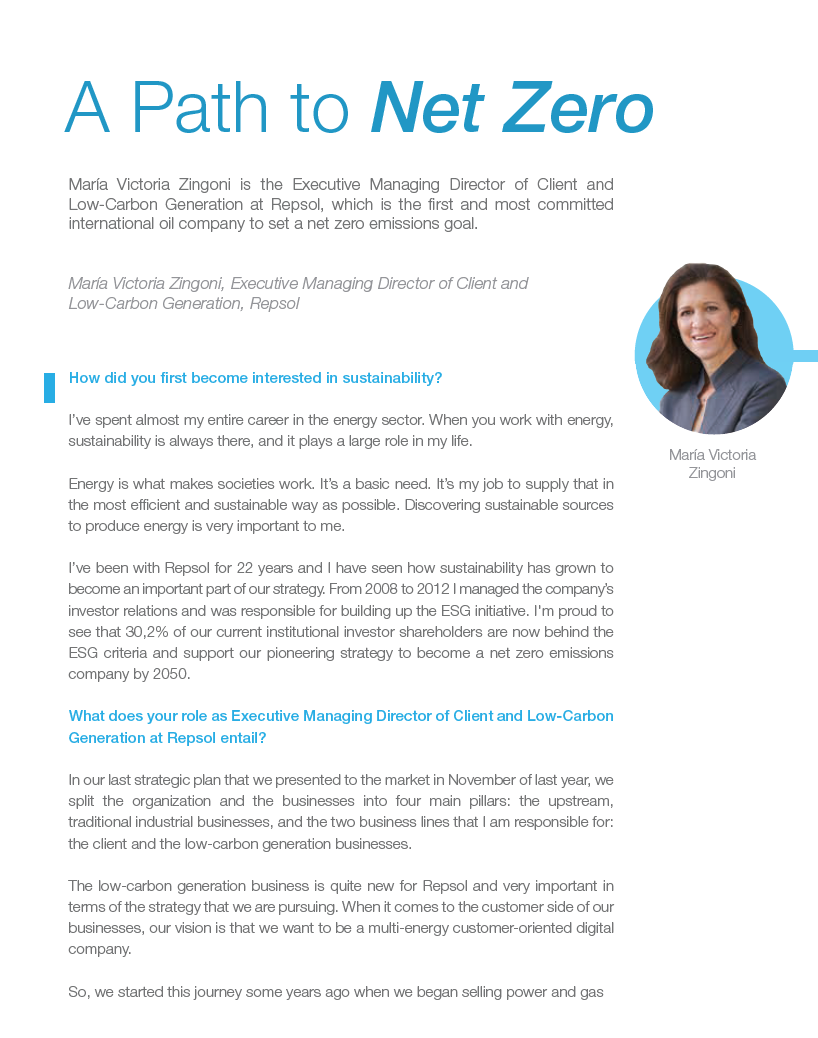"How did you first become interested in sustainability?"
Sustainability has been at the forefront throughout my education and professional life. I received my undergraduate degree in Biology and did a Master’s in Environmental Technology. I’ve worked at the UN in Central America covering sustainability projects. I also worked as a sustainability consultant at PWC for 10 years. When I joined that team in London, we were 10 people. By the time I left in 2014, we were 100. People coming out of university now can have a professional future in sustainability but it was not necessarily a career that many were aware of about 20 years ago.
What does your role as Head of Responsible Investment at Actis entail?
I take part in the investment decision-making process. For every deal that we look at, we undertake systematic due diligence to understand which ESG risks might be material. Sitting on the investment committees, my team advises on the level of risk and also whether the mitigation actions we can take would lower that risk to within our acceptable tolerance limits. We also advise on what the value creation tasks would look like during our ownership period. What are the types of work streams that we would seek to put into place? What is part of the hundred-day plan?
As a member of the executive committee, I also consider sustainability from a strategic point of view. Macro-trends such as climate change demand analysis of risks to ensure our investment strategies and decisions do not expose our businesses to near or long term risks. Such analysis is nuanced as sectors are rarely ‘sustainable’ or ‘unsustainable’. For example, in the digital sector there’s an explosion in demand for data centers, which provide critical digital infrastructure to enable economic growth, but on the other hand, it’s energy intensive. So, part of my role is to examine such trade-offs and come to an Actis view on whether or not a sector or an investment supports our sustainability objectives.
What themes or trends in sustainability are you most excited about over the next five to 10 years?
One of the largest issues in the world today by far is the climate crisis and the need to fast-track the energy transition to a low carbon future. This area represents a really exciting opportunity. Actis is a significant investor in renewable power-generation companies and there is huge demand for green power infrastructure globally and certainly in growth markets. I think any investor, whether you have sustainability goals or not, needs to be thinking about climate risk and opportunity.
Another emerging sustainability theme for this year and beyond is a focus on biodiversity and protecting ecosystems. A seminal report was issued in February in the U.K. called the Dasgupta Review, which looks at the economic impact of biodiversity loss. Biodiversity is declining faster than at any other time in human history and extinction rates are unprecedented. The COVID-19 pandemic is increasingly being linked to biodiversity loss and natural habitat degradation due to the encroachment by and proximity of humans to wild regions that has enabled the virus to jump across the species barrier. Finally, biodiversity loss links to climate change, so for all of those reasons, it is going to get much more attention from investors in the next few years.
How does Actis integrate ESG principles into its portfolio?
Actis has integrated ESG principles into the portfolio since inception in 2004. We have five policies in the area of sustainability: Environmental, Climate Change, Health and Safety, Business Integrity, Social.
ESG issues are integrated into the investment decision making process, and into the investment committee (IC) papers at all stages from screening to final IC. I or someone from my team is always present at the IC meetings. We are there to discuss the ESG issues and advise the IC members. We are involved in the due diligence, including undertaking site visits.
We regularly gather ESG key performance indicators from our companies and monitor progress against key work streams on themes like anti-corruption, health and safety, community engagement, resource efficiency and improving diversity.
Do you still see unmet funding needs, despite investor demand to deploy capital in the broader sustainability space?
Infrastructure is hugely underfunded. Around $100 trillion dollars of infrastructure is needed for the next two decades to provide power and keep the lights on in many emerging economies. Putting sustainability aside, we need another planet of power plants to meet the needs of the growing population across the globe. The scale of infrastructure investment needed is huge. In developing countries, there is a high correlation between power generation and GDP, the provision of incremental power is absolutely linked to economic development and of course provides jobs, supports SMEs, industry and grows local and domestic supply chains.
It’s a resilient, defensive sector. And if you do have sustainability objectives, it’s a fantastic way to meet those because you’re investing directly to support the energy transition. We think the returns and the sustainability outcomes are intertwined really really well in sectors like renewables.
What are the most significant threats to the overall energy transition?
There’s a huge movement in the race to net zero and supporting the energy transition. Over 1,200 companies have made net zero commitments. Asset owners are collaborating via the Net-Zero Asset Owner Alliance.
Where we are seeing the slower pace is government policy makers failing to make commitments that are Paris-aligned or failing to meet the commitments that they’ve already made, not putting in place the right framework to enable the transition, and not proactively thinking about carbon tax regime. That is what’s mainly putting the brakes on the energy transition economy.
Disclaimer
This content has been prepared by Nomura solely for information purposes, and is not an offer to buy or sell or provide (as the case may be) or a solicitation of an offer to buy or sell or enter into any agreement with respect to any security, product, service (including but not limited to investment advisory services) or investment. The opinions expressed in the content do not constitute investment advice and independent advice should be sought where appropriate.The content contains general information only and does not take into account the individual objectives, financial situation or needs of a person. All information, opinions and estimates expressed in the content are current as of the date of publication, are subject to change without notice, and may become outdated over time. To the extent that any materials or investment services on or referred to in the content are construed to be regulated activities under the local laws of any jurisdiction and are made available to persons resident in such jurisdiction, they shall only be made available through appropriately licenced Nomura entities in that jurisdiction or otherwise through Nomura entities that are exempt from applicable licensing and regulatory requirements in that jurisdiction. For more information please go to https://www.nomuraholdings.com/policy/terms.html.





